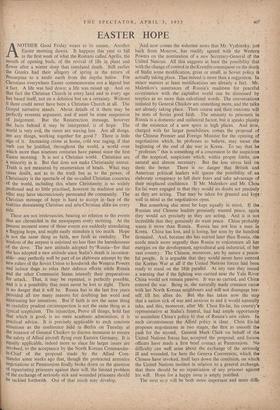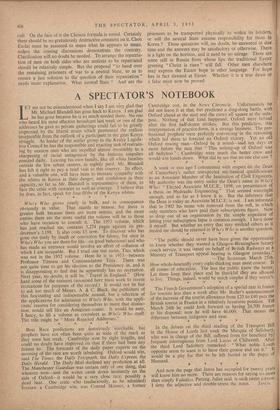EASTER HOPE
ANOTHER Good Friday wears to its sunset. Another Easter morning dawns. It happens this year to fall in the first week of what the Rothans called Aprilis, the month of opening buds, of the revival of life in plant and flower after a winter sleep that simulated death. Still earlier the Greeks had their allegory of spring in the return of Proserpina to a sunlit earth from the depths belOw. For Christians everywhere Easter commemorates not a legend but a fact. A life was laid down; a life was raised up. And on that fact the Christian Church in every land and in every age has based itself, not on a delusion but on- a certainty. Without it there could never have been a Christian Church at all. The Gospel narrative stands. About details of it there may be Perfectly reverent argument, and if need be some suspension of judgement. But the Resurrection message, however the facts behind it may be interpreted, is of hope. The world is very evil, the times are waxing late. Are all things, are any things, working together for good ? There is little sign of it. Increasing crime at home, cold war raging, if ,that verb can be justified, throughout the world, a world over Which more than nineteen centuries have passed since the first Easter morning. It is not a Christian world. Christians are a minority in it. But that does not make Christianity untrue. Truth is not measured by enumeration of heads. What may cause doubt, not as to the truth but as to the' power, of Christianity is the spectacle of the so-called Christian countries of the world, including this where Christianity is so widely professed and so little practised, however its tradition and its ethic may have unconsciously permeated the community. The Christian message of hope is hard to accept in face of the realities threatening Christian and non-Christian alike on every side.
These are not irrelevancies, bearing no relation to the events that are chronicled in the newspapers every morning. At the Present moment some of those events are suddenly stimulating a flagging hope, and might easily stimulate it too much. Hope is not the same thing as faith, nor faith as credulity. The wisdom of the serpent is enjoined no less than the harmlessness of the dove. The new attitude. adopted by'Russia—for that she has adopted a new attitude since Stalin's death is incontest- able—may perfectly well be part of an elaborate attempt by the new rulers of the Soviet Union to hoodwink the Western Powers and induce them to relax their defence efforts while Russia and the other Communist States intensify their preparations for attack. That, it may be repeated, is perfectly possible, and it is a possibility that must never be lost to sight. There is no danger that it will be. Russia has in the last five years provided all too many reasons for doubting her word and mistrusting her intentions. But if faith is not the same thing as credulity prudent circumspection is not the same thing as a Cynical scepticism. The injunction, Prove all things; hold fast that which is good, is no mere academic admonition; it is Practical advice. It is precisely applicable to such concrete situations as the conference held in Berlin on Tuesday at the instance of General Chuikov to discuss measures to ensure the safety of Allied aircraft flying over Eastern Germany. It is equally applicable, indeed more so since far larger issues are involved, to the acceptance by the North Korean Commander- hi-Chief of the proposal made „ by the Allied Com- mander some weeks ago that, though 'the protracted armistice negotiations at Panmunjom filially broke down on the question of repatriating prisoners against their will, the limited problem of the exchange of seriously sick and wounded prisoners should be tackled forthwith. Out of that much may develop. And now conies the welcome news that Mr. Vyshinsky, just back from Moscow, has readily agreed With the Western Powers on the nomination of a new Secretary-General of the United Nations. All this suggests at least the possibility that with the change of control in the Kremlin consequent on the death of Stalin some modification, great or small, in Soviet policy is actually taking place. That indeed is more than a suggestion. In minor matters at least modifications are already a fact. Mr. Malenkov's assurances of Russia's readiness for peaceful co-existence with the capitalist world can be dismissed by sceptics as no more than calculated words. The conversations initiated by General Chuikov are something more, and the talks are already taking place. Their course and their outcome will be tests of Soviet good faith. The amnesty to prisoners in Russia is a domestic and unilateral factor, but it speaks plainly of the existence of a new spirit in high places. And now, charged with far larger possibilities, comes the proposal of the' Chinese Premier and Foreign Minister for the opening of negotiations which, , he professes to believe, may mean the beginning of the end of the war in Korea. To say that ho " professes " this is something of a concession to the suspicions of the sceptical, suspicions which, within proper limits, are natural and almost necessary. But the less stress laid on them the better. There is no danger that British and American political leaders will ignore the possibility of an elaborate conspiracy to lull their fears and take advantage of their misplaced confidence. If Mr. Malenkov and Mr. Chou En-lai were engaged in that they would no doubt act precisely as they are acting. That may be taken for &ranted and kept well in mind as the negotiations open. But something else must be kept equally in mind. If the Russian and Chinese leaders genuinely wanted peace, again they would act, precisely as they are acting. And it is not incredible that they genuinely do want peace. China probably wants it more than Russia. Russia has not lost a man in Korea. China has lost, and is losing, her sons by the, hundred thousand. And, because she has started later than Russia, she needs much more urgently than Russia to concentrate all her energies on the development, agricultural and industrial, of her vast country. The Chinese, moreover, are by nature a peace- ful people. It is arguable that they would never have entered the Korean War at all if the United Nations forces had been ready to stand on the 38th parallel. At any rate they issued a warning that if the fighting was carried near the Yalu River China would not remain passive. It was so carried, and China entered the war. Being in, she naturally made common cause with her North Korean neighbours and will not disengage her- self till .her, allies do. But she has taken now the step that a nation sick of war and anxious to end it would naturally take, and this, moreover, after Mr. Chou En-lai, his country's representative at Stalin's funeral, had had ample opportunity to assimilate China's policy t'o that of Russia's new rulers. In such circumstances the Allied policy is clear. Chou En-lai proposes negotiations in two stages, the first to smooth the path for the second. General Mark Clark on behalf of the United Nations forces has, accepted the proposal, and liaison officers have made a first brief contact at Panmunjom. No difficulty can well arise about the exchange of the seriously., ill and wounded, for here the Geneva Convention, which the Chinese have invoked, itself lays down the condition, on which the United Nations insisted in relation to a_general exchange, that there should be no 'repatriation of any prisoner against his will. Hope for a happy issue is amply justified.
The next step will be both more important and more diffl, cult. On the faCe of it the Chinese formula is sound. Certainly there should be no gratuitously destructive comment on it. Chou En-lai must be assumed to mean what he appears to mean, unless the coming discussions demonstrate the contrary. Clarification will no doubt be needed. To arrange the repatria- tion of men on both sides who are anxious to be repatriated should be relatively simple. But the proposal " to hand over the remaining prisoners of war to a neutral State, so as to ensure a just solution to the question of their repatriation " needs more explanation. What neutral State ? And are the prisoners to be transported physically to within its borders, or will the neutral State assume responsibility for them in Korea ? These questions will, no doubt, be-answered in duo time and the answers may be satisfactory or otherwise. Thera is a light on the horizon, and it need be no mirage. There are some still in Russia from whose lips the traditional Easter greeting " Christ is risen " will fall. Other men elsewhere may express the Easter hope in other language. For hope has in fact dawned at Easter. Whether it is a true dawn or a false must now be proved.



































 Previous page
Previous page